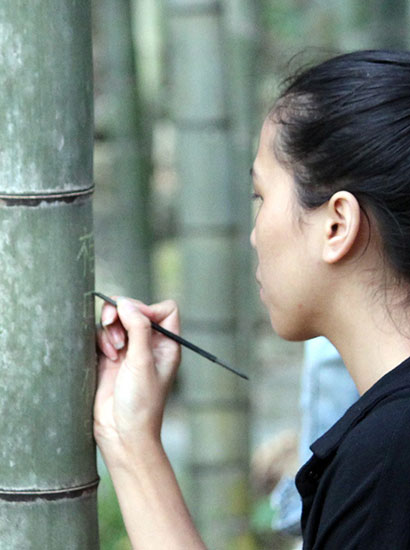Is graffiti zone on mountain a good idea?
 |
|
A visitor writes on a bamboo shoot in a public graffiti zone on Jinzi Mountain in Guangdong province.[Photo by Zeng Linghua/For China Daily] |
He said that forest rangers will remove obscene words and illegal messages if they spot any and that shaving off the bark won't influence the bamboo's growth.
No such words or messages have been discovered since the special zone's opening, but a warning board will be set up, Zeng added.
In addition to Jinzi Mountain, the Bamboo Sea, a tourist attraction in Yibin, Sichuan province, earmarked a special zone for visitors to carve on bamboo in 2013.
An administrative director in Bamboo Sea's marketing department told China Daily that graffiti in the scenic area has been reduced substantially since the special zone was opened.
Many tourist attractions in China have fallen victim to graffiti, including the Great Wall.
Photos of a young Chinese couple carving their names on the Great Wall with keys while climbing the ancient wonder during the National Day holiday went viral on social media.
Great Wall authorities set aside areas for graffiti in the Mutianyu section in 2014, but that didn't stop people from carving their names in other places.
"We cannot rely on launching 'forests for carving' to stop tourists from vandalizing tourist sites, just as we cannot reduce theft by launching 'forests for stealing'," said Sun Daojin, a professor of environmental philosophy at Southwest University, in a post on his micro blog at people.com.cn.
"The key to solving the problem lies in tourists' awareness and scenic areas' management."



 Print
Print Mail
Mail

